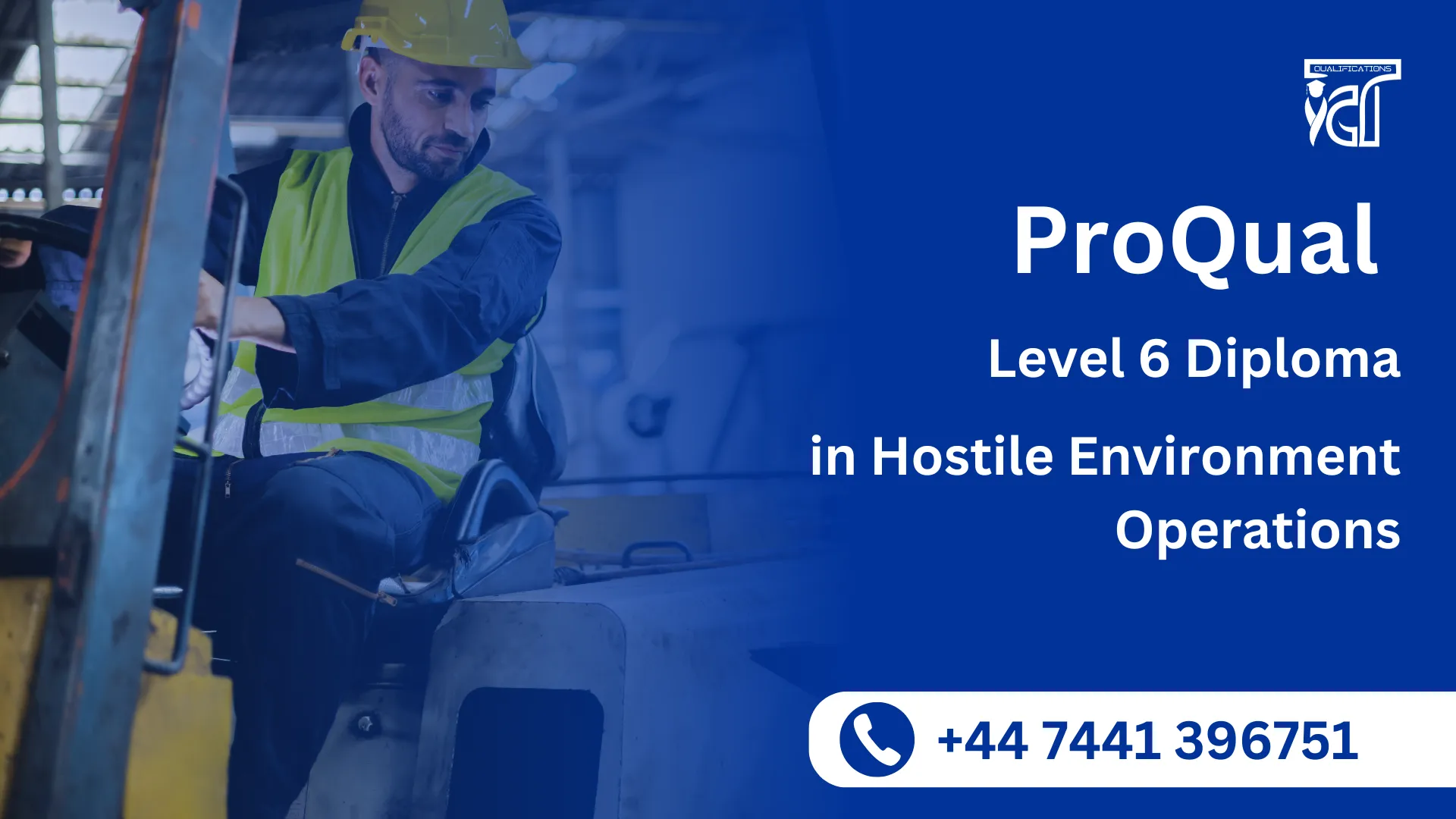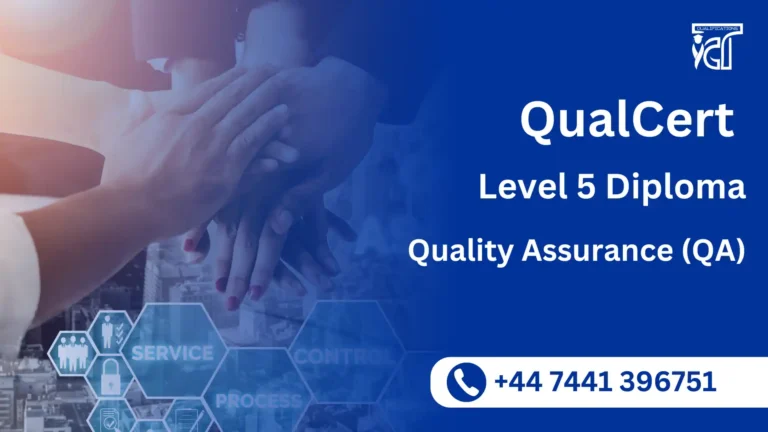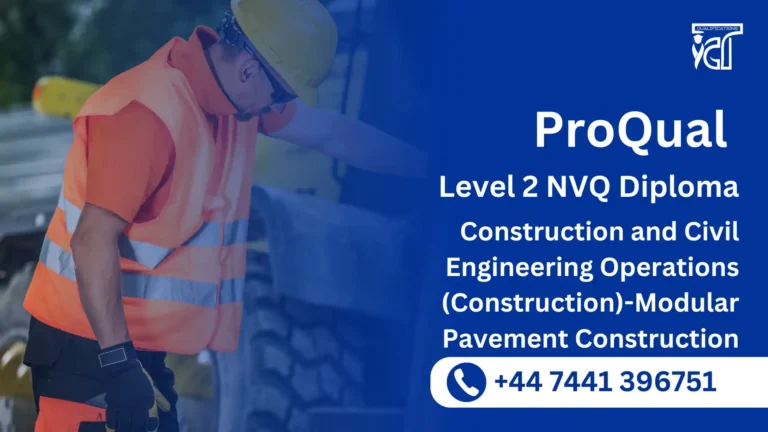In an increasingly complex global landscape, professionals working in high-risk settings need specialized skills to ensure safety and operational success. The ProQual Level 6 Diploma in Hostile Environment Operations is an internationally recognized qualification designed to equip individuals with advanced expertise for operating in challenging and unpredictable environments, such as conflict zones or disaster areas. Tailored for security professionals, humanitarian aid workers, and law enforcement personnel, this diploma provides comprehensive training in risk assessment, crisis management, and tactical operations, aligning with global standards and accredited by ProQual Awarding Body under the Regulated Qualifications Framework (RQF).
This rigorous program combines theoretical knowledge with practical, scenario-based training to prepare participants for real-world challenges in hostile environments. Developed with input from former UK Special Forces and intelligence experts, the curriculum covers critical areas like threat assessment, surveillance, close quarter battle (CQB) tactics, and emergency response strategies. The course emphasizes hands-on skills and strategic decision-making, enabling graduates to mitigate risks, protect lives, and execute operations with precision and confidence in high-stakes settings.
Ideal for those seeking to advance in high-risk security or operational roles, the ProQual Level 6 Diploma enhances career prospects in fields like private security, humanitarian aid, and global operations. Its flexible delivery, available online or through intensive in-person sessions, allows professionals to balance their studies with work commitments while earning a globally respected credential. By completing this diploma, graduates demonstrate their ability to excel in demanding environments, making them valuable assets to employers in Saudi Arabia and worldwide. Enroll today to gain the skills needed to lead with confidence in hostile environment operations.
ProQual Level 6 Diploma in Hostile Environment Operations
The ProQual Level 6 Diploma in Hostile Environment Operations, achieve the qualification candidates must achieve all of the mandatory units of 300 Total Qualification Time (TQT), 100 GLH and 30 Credits:
| Sr# | Unit Title | Unit Level |
|---|---|---|
| 1 | Hostile environment operations | 6 |
GLH (Guided Learning Hours) and TQT (Total Qualification Time) are terms commonly used in vocational qualifications to help define the amount of time a learner is expected to spend on their studies.
1. GLH (Guided Learning Hours)
GLH refers to the number of hours a learner spends being directly taught, supervised, or supported during their course. This includes the time spent in activities such as:
- Classroom instruction
- Practical workshops
- One-on-one tutoring or mentoring sessions
- Online learning sessions with tutor support
In other words, GLH represents the time that learners are actively engaged with their instructors or learning activities.
2. TQT (Total Qualification Time)
TQT represents the total amount of time a learner is expected to invest in completing a qualification, including:
- GLH (Guided Learning Hours): Time spent on direct learning, as explained above.
- Self-Directed Learning: This includes time spent on independent study, research, assignment completion, preparation for exams, and any other work the learner does outside of direct teaching hours.
TQT is a broader measure that includes all the time required to achieve the qualification. It helps learners and employers understand the overall commitment required for the qualification.
Key Differences Between GLH and TQT:
- GLH focuses on direct learning with guidance or supervision.
- TQT includes GLH as well as independent study time and other learning-related activities.
Example:
If a qualification has a TQT of 600 hours and a GLH of 250 hours, it means the learner should spend 250 hours in direct learning (classroom, online, or tutor-led sessions) and 350 hours on independent study or research.
ProQual Level 6 Diploma in Hostile Environment Operations
Hostile Environment Operations
- Effectively plan and prepare for operating in a complex/hostile environment
- Competently operate within a crisis management team.
- Demonstrate personal security strategies
- Demonstrate an understanding of foreign liaisons.
- Understand the dynamics of radio procedures.
- Be competent in incident management
- Have a generic understanding of weapons and mines.
- Understand the generic make-up and deployment of mines.
- Mitigate the escalation of civil unrest and demonstrations.
- Understand Improvised explosive device generics and their methodology
- Conduct vehicle search.
- Provide crisis management within an active shooter scenario.
- Follow methodology for conduct under capture/hostage taking.
- Be competent in escape and evasion techniques
- Show techniques to sustain life
- Be able to plan safe routes of passage.
- Conduct vehicle ambush drills.
- Conduct vehicle mine strike drills
- Demonstrate vehicle breakdown techniques in remote locations.
- Understand ballistics and their capabilities.
- Show an understanding of firearm characteristics and manipulation.
- Identify the reasons for the covert carry of a firearm.
- Gain close quarter combat skills (CQC – Self Defence).
- Be able to conduct surveillance within a complex/hostile environment.
- Be able to conduct Building/Venue reconnaissance
Benefits of the ProQual Level 6 Diploma in Hostile Environment Operations
The ProQual Level 6 Diploma in Hostile Environment Operations offers a range of significant benefits for professionals working in high-risk areas. This qualification equips you with the knowledge, skills, and practical experience required to handle the challenges of operating in dangerous and unpredictable environments. Here are the key benefits of undertaking this diploma:
1. Ofqual-Regulated and Globally Recognized
- The ProQual Level 6 Diploma is Ofqual-regulated, meaning it meets the highest educational standards set by the UK government. As a globally recognized qualification, it is respected by employers worldwide in industries such as security, military, and humanitarian aid.
2. Practical, Assignment-Based Learning
- The course is entirely assignment-based, eliminating the need for exams. This approach focuses on real-world application, ensuring you can demonstrate your skills in practical, operational settings. You will gain hands-on experience through assignments that simulate real-life hostile environment scenarios.
3. Specialized Training for Hostile Environments
- The diploma provides specialized training for professionals working in high-risk zones, such as conflict regions, disaster areas, or politically unstable environments. You’ll develop critical skills in areas like risk assessment, crisis management, survival tactics, and close-quarter combat.
4. Advanced Security and Tactical Skills
- Learn advanced tactical combat techniques and crisis management strategies essential for hostile environments. This qualification will train you to make decisions under pressure, manage security operations, and ensure the safety of personnel and assets in unstable and dangerous situations.
5. Enhanced Employability and Career Opportunities
- Completing the ProQual Level 6 Diploma significantly boosts your employability in security and military roles. It enhances your credibility and qualifications, making you a competitive candidate for senior positions in security firms, private military contracting, law enforcement, and humanitarian aid organizations.
6. Psychological Resilience and Stress Management
- The course emphasizes psychological resilience, teaching you how to manage stress, maintain focus, and perform well in high-pressure situations. These mental and emotional management skills are vital when working in dangerous or unpredictable environments.
7. Leadership Development
- Gain critical leadership skills necessary for leading teams in high-risk environments. The course focuses on tactical decision-making and team management, preparing you for senior roles where leadership is essential to mission success.
8. Survival and Emergency Evacuation Skills
- The qualification includes comprehensive survival techniques and emergency evacuation training. This ensures that you can effectively respond to emergencies, secure personnel, and navigate dangerous situations safely and efficiently.
9. Comprehensive Skill Set for Diverse Roles
- The skills acquired through this qualification are applicable to various sectors, including security operations, private military contracting, humanitarian aid, and disaster relief operations. You will be equipped to work across a wide range of industries that require expertise in managing high-risk and hostile environments.
10. Pathway for Career Progression
- The ProQual Level 6 Diploma can serve as a stepping stone for further qualifications or career progression. You may choose to pursue higher-level roles in security management, specialized military training, or strategic consulting for high-risk operations.
11. Flexibility and Convenience
- The assignment-based learning approach offers flexibility, allowing you to complete the course at your own pace while balancing work or other commitments. This makes the qualification ideal for busy professionals in the security, military, or law enforcement sectors.
12. Competitive Advantage in the Security and Military Sector
- The increasing demand for skilled professionals in hostile environments means that graduates of this diploma have a significant competitive advantage in the security and defense industries. The advanced knowledge and practical skills you gain will set you apart in the job market.
13. Real-World Application
- The assignments and training are specifically designed to prepare you for real-world situations in hostile environments. You will be better equipped to handle the unpredictable nature of these areas, ensuring that you can apply what you’ve learned immediately in operational scenarios.
The ProQual Level 6 Diploma in Hostile Environment Operations is designed for professionals who operate or aspire to operate in high-risk environments, such as conflict zones, disaster areas, or politically unstable regions. This qualification is perfect for those seeking to enhance their tactical skills, crisis management expertise, and ability to make strategic decisions under pressure. Below are the groups of individuals who are the best fit for this course:
1. Security Professionals
- Private security contractors, close protection officers, and those working in high-risk areas for security firms. This qualification enhances their ability to assess risks, manage crises, and deploy advanced security measures in hostile environments.
2. Military Personnel (Current and Ex-Servicemen)
- Active military personnel or ex-servicemen who want to transition to civilian security roles or expand their skillset in hostile environment operations. This course helps them further develop their tactical operations, close-quarter combat, and leadership skills.
3. Private Military Contractors (PMCs)
- Private military contractors who work in conflict zones and unstable regions. The course provides the advanced skills required for operational effectiveness, safety, and leadership in high-risk areas, making it ideal for those aiming to enhance their expertise in private security services.
4. Humanitarian Aid Workers
- NGO workers, humanitarian aid professionals, and individuals working with international organizations who are involved in disaster relief, refugee assistance, or peacekeeping in unstable regions. This qualification equips them with the skills needed to operate safely and effectively in hostile environments.
5. Law Enforcement Officers
- Police officers or law enforcement professionals preparing for operations in volatile or high-risk situations, including crisis management, counter-terrorism, or riot control. This course builds key skills for tactical decision-making and team leadership in dangerous environments.
6. Crisis Management and Emergency Response Teams
- Individuals working in emergency response or crisis management, who are responsible for coordinating security operations in emergency or high-risk scenarios. The course prepares them for making decisions under pressure and ensuring safety during unpredictable or hostile situations.
7. Security Trainers and Instructors
- Security trainers and instructors who wish to teach hostile environment operation skills to others. This course equips trainers with the knowledge and experience to deliver effective training in high-risk operations, close combat tactics, and survival skills.
8. Adventure Expedition Leaders
- Adventure travel guides and expedition leaders who lead groups into remote or high-risk areas. This qualification ensures they have the survival and tactical skills necessary to manage the safety of their teams in potentially dangerous situations.
9. Individuals Seeking Advanced Tactical Training
- Any individual passionate about pursuing a career or further developing their expertise in security and tactical operations in hostile environments. This course is ideal for those looking to gain a competitive edge in the security, defense, or law enforcement sectors.
Future Career Progression After the ProQual Level 6 Diploma in Hostile Environment Operations:
Understanding the Diploma — Scope and Focus
- Recognized Level 6 qualification equivalent to a bachelor’s-level NVQ
- Emphasizes:
- Risk and threat assessment in complex zones
- Close quarter battle (CQB) and confined-space tactics
- Mission planning and leadership under stress
- Adaptive communication and team coordination
- Ethical, legal, and psychological resilience frameworks
- Delivered via scenario-based training, simulations, and expert instruction in realistic environments
Entry-Level Roles Post-Completion
Graduates are ready for operational and tactical roles such as:
- Field Operator or Tactical Team Member in security or defense sectors
- Private Military Contractor or Executive Protection Specialist
- NGO or Humanitarian Worker in crisis zones with hostile exposure
- Tactical Operations Coordinator or Field Risk Assessor
Starting positions generally offer competitive packages with opportunities for deployment-based allowances.
Mid-Career Progression (1–3 Years)
With field experience and demonstrated competence, advancement may include:
- Team Leader or Tactical Supervisor overseeing small-unit operations
- Instructor or Training Officer in hostility preparedness or CQB modules
- Operations Planner or Risk Analyst supporting mission development and execution
- Consultant or Advisor for international agencies, corporations, or NGOs
Compensation grows as responsibilities expand, particularly in coordination or leadership roles within private security or government-linked operations.
Senior-Level Advancement (3+ Years)
Longer-term career progression can lead to:
- Operational Leadership Roles in multinational security firms, peacekeeping forces, or tactical units
- Programme Director or Training Manager overseeing regional preparedness training
- Security Consultant or Strategic Advisor specializing in hostile environment deployment strategy
- Advanced Qualifications including executive protection, crisis leadership, counterterrorism or intelligence analytics
Seasoned professionals in leadership or advisory tracks can command earnings reflecting high-level operational experience and regional assignments.
Typical Compensation Overview
Role & Estimated Salary Range (international/UK-based):
- Tactical Operator / Team Member: high £30,000s to £50,000+
- Training Officer / Risk Coordinator: £40,000 to £70,000+
- Tactical Team Leader or Consultant: £60,000+ depending on sector and deployment
- Strategic Operations Director or Senior Advisor: £80,000 to £100,000+ in multinational or government-linked roles
Exact figures depend on deployment location, organization type, and individual expertise.
Key Skills & Certifications for Progression
Operational & Analytical Skills:
- Advanced CQB, tactical insertion, and urban operations
- Risk mapping, threat mitigation planning, and mission debrief
Leadership & Management:
- Coordinating small teams under stress
- Training instruction and curriculum development
- Crisis communication and decision-making protocols
Compliance & Ethics:
- Applying lawful conduct and rules of engagement
- Familiarity with international legal frameworks and cultural sensitivity
- Personal resilience strategies and team welfare management
Professional Development:
- Certifications in counterterrorism, executive protection, intelligence operations
- Instructor accreditation or specialized tactical instructor qualifications
- Continuous development via operational field exercises and CPD activities
Practical Next Steps & Career Advice
- Document and gather real-world training evidence and scenario performance
- Seek opportunities to demonstrate leadership in field exercises or operations
- Network within operational and training communities across security, humanitarian, and defense sectors
- Consider instructor roles or portfolio development in your specialty
- Explore advanced micro-credentials or strategic courses in crisis leadership or security consultancy
Entry Requirements
Register Now
Qualification Process
Qualification Process for the ProQual Level 6 Diploma in Hostile Environment Operations
- Self-Assessment:
Begin by evaluating your eligibility to ensure you meet the qualification requirements, including work experience, knowledge, and language proficiency. - Registration:
Complete your registration by submitting the required documents, including a scanned copy of a valid ID, and paying the registration fee. - Induction:
An assessor will conduct an induction to confirm your eligibility for the course and explain the evidence requirements. If you do not meet the criteria, your registration will be canceled, and the fee will be refunded. - Assignmnets & Evidence Submission:
Provide all assignmnets and the necessary evidence based on the assessment criteria outlined in the course. If you are unsure of the required evidence, consult with the assessor for guidance on the type and nature of evidence needed. - Feedback and Revision:
The assessor will review your submitted evidence and provide feedback. Evidence that meets the criteria will be marked as “Criteria Met,” while any gaps will be identified. You will be asked to revise and resubmit if needed. - Competence Evidence:
Submit final evidence demonstrating that all learning outcomes have been met. This evidence will be marked as “Criteria Met” by the assessor once it is satisfactory. - Internal Quality Assurance (IQA):
The Internal Quality Assurance Verifier (IQA) will review your evidence to ensure consistency, quality, and compliance with standards. - External Verification:
The IQA will submit your portfolio to ProQual’s External Quality Assurance Verifiers (EQA) for final confirmation. The EQA may contact you directly to verify the authenticity of your evidence. - Certification:
Upon successful completion of all checks, ProQual will issue your official certificate, confirming that you have attained the ProQual Level 6 Diploma in Hostile Environment Operations.
FAQs for ProQual Level 6 Diploma in Hostile Environment Operations







